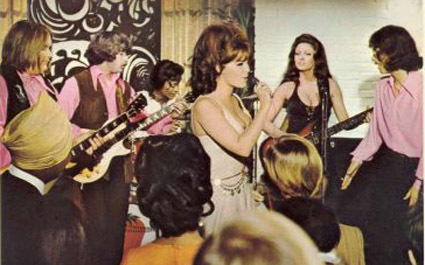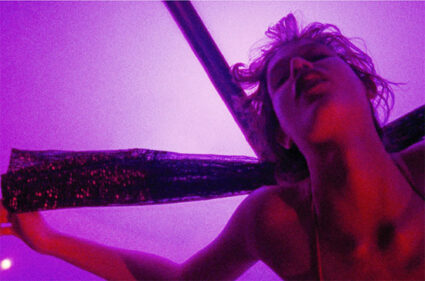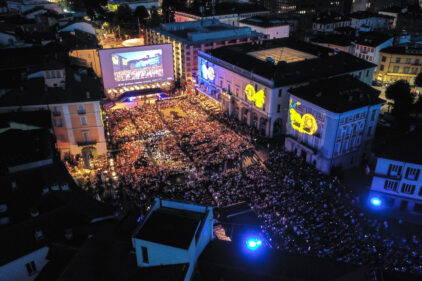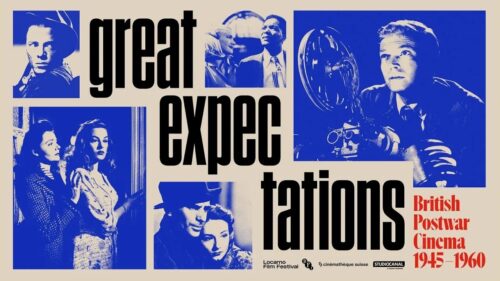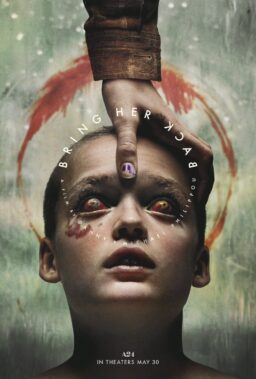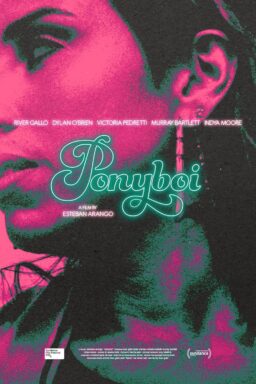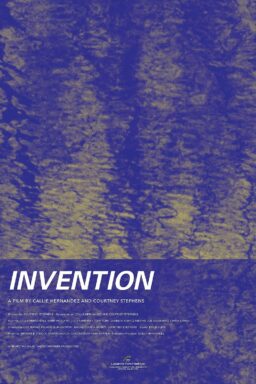April 25 – 29
Virginia Theatre
203 West Park Avenue
Champaign, IL
www.ebertfest.com
Set your Strawberry Alarm Clocks: The annual spring ritual of Roger Ebert’s Film Festival in Urbana-Champaign (now in its ninth year) runs April 24 -29, 2007, at the gorgeous old Virginia Theatre. The name of the fest has always been rather flexible: “Roger Ebert’s Overlooked Film Festival,” “The Overlooked” (sounding like something from “The Shining“), “Ebertfest”… Next year, the event will been officially re-named: Ebertfest — the Roger Ebert Film Festival.
The tradition of appreciating “overlooked” films (by any criteria Ebert chooses to apply) continues, however. The festival will climax with a closing-day screening of Russ Meyer’s “Beyond the Valley of the Dolls” (screenplay by Ebert himself) and a live performance by the Strawberry Alarm Clock, the psychedelic rock band featured in the film (and in Jack Nicholson’s 1968 “Psych-Out,” as well).
Roger Ebert will be there, introducing the festival and watching the films with the audience, but because he’s still recuperating from surgery, will rely on an “expert group of colleagues” to conduct the on-stage interviews this year.
Other guests of the fest will include Werner Herzog (appearing with “Stroszek,” Paul Cox (director of “Man of Flowers”), actress Fatoumata Coulibaly (“Moolaade“), writer-director Joey Lauren Adams and festival favorite, actor Scott Wilson (“Come Early Morning”), director Andrew Davis (“Holes“), film scholars David Bordwell, Kristin Thompson and Samba Gadjido, musician Jim White, producer/distributor Michael Barker (Sony Classics), and plenty more.
The 13 films featured in this year’s Ebertfest are listed below, with titles linking to Ebert’s original reviews of the films, where applicable. Other blurbs come from the festival’s official web site, where the complete schedule and details can be found: www.ebertfest.com.
(Note: That headline is based on a famous line from Z-man in “Beyond the Valley of the Dolls” that was reprised by the titular hero in “Austin Powers: International Man of Mystery“: “It’s my happening and it freaks me out!”)
* * * *
“Gattaca“
What is genetic engineering, after all, but preemptive plastic surgery? Make the child perfect in the test tube, and save money later. Throw in perfect health, a high IQ and a long life-span, and you have the brave new world of “Gattaca,” in which the bioformed have inherited the earth, and babies who are born naturally get to be menial laborers. This is one of the smartest and most provocative of science fiction films, a thriller with ideas. Its hero is a man who challenges the system. Vincent (Ethan Hawke) was born in the old-fashioned way, and his genetic tests show he has bad eyesight, heart problems and a life expectancy of about 30 years.
We think of tragic heroes outlined against the horizon, tall and doomed, the victims of their vision and fate, who fall from a great height. “The Weather Man” is about a tragic hero whose fall is from a low height. David Spritz (Nicolas Cage) is a Chicago weatherman whose marriage has failed, whose children are troubled, whose father is disappointed, and whose self-esteem lies in ruins. “All of the people I could be,” he tells us, “they got fewer and fewer until finally they got reduced to only one — and that’s who I am. The weather man.” There is nothing ignoble about being a weatherman, especially in Chicago, where we need them. David’s fatal flaw (all tragic heroes have one) is that he does not value his own work.
“Moolaade”
All I can tell you is, “Moolaade” is a film that will stay in my memory and inform my ideas long after other films have vaporized. It takes place in a village in Senegal, where ancient customs exist side by side with battery-powered radios, cars and trucks, and a young man returning from Paris. Traditional family compounds surround a mosque; they are made in ancient patterns from sun-baked mud and have the architectural beauty of everything that is made on the spot by the people who will use it, using the materials at hand. The colors of this world are the colors of sand, earth, sky and trees, setting off the joyous colors of the costumes.
“Perfume: The Story of a Murderer“
This is a dark, dark, dark film, focused on an obsession so complete and lonely it shuts out all other human experience. You may not savor it, but you will not stop watching it, in horror and fascination. Whishaw succeeds in giving us no hint of his character save a deep savage need. And Dustin Hoffman produces a quirky old master whose life is also governed by perfume, if more positively…. Why I love this story, I do not know. Why I have read the book twice and given away a dozen copies of the audiobook, I cannot explain. There is nothing fun about the story, except the way it ventures so fearlessly down one limited, terrifying, seductive dead end, and finds there a solution both sublime and horrifying. It took imagination to tell it, courage to film it, thought to act it, and from the audience it requires a brave curiosity about the peculiarity of obsession.
“Sadie Thompson”
To modern audiences, Gloria Swanson is Norma Desmond, the deluded aging screen star in Billy Wilder’s acerbic 1950 classic, “Sunset Boulevard.” Longing for an impossible comeback (or “return,” as she insists on calling it), she famously declares of silent movies, “We didn’t need dialogue. We had faces!” Sadly, most audiences today can’t fully appreciate that line, never having seen one of Swanson’s star turns from the silent era. “Sunset Boulevard” came along only a couple of decades after Swanson’s career fizzled with the coming of sound. In 1950, many film-goers would still have known exactly what she meant. The revival of films like Sadie Thompson allows the current generation to discover Swanson’s career in its heyday. In fact, “Sunset Boulevard” brought the actress her third Oscar nomination. Her first nomination was for Sadie Thompson. — Kristin Thompson
“Come Early Morning”
“Come Early Morning” [is] the story of a small-town woman [Ashley Judd] whose pattern is to get drunk, sleep with a guy she picks up in a bar, and make a quick getaway the next morning. But her character is not quite that simple. She also holds down an important desk job in a construction company, goes to church with her dad [Scott Wilson] in hopes of getting closer to him, and is a good friend –- or girl friend, because no guy gets very close, until she meets a nice man played by Jeffrey Donovan…. In a more conventional movie, she would learn to love him, and leave all her issues behind. “But I didn’t want this movie to be about how all her problems are solved when she meets the right guy,” Joey Lauren Adams told the audience at the Sundance premiere.
Movies do not change, but their viewers do. When I saw “La Dolce Vita” in 1960, I was an adolescent for whom “the sweet life” represented everything I dreamed of: sin, exotic European glamour, the weary romance of the cynical newspaperman. When I saw it again, around 1970, I was living in a version of Marcello’s world; Chicago’s North Avenue was not the Via Veneto, but at 3 a.m. the denizens were just as colorful, and I was about Marcello’s age.
When I saw the movie around 1980, Marcello was the same age, but I was 10 years older, had stopped drinking, and saw him not as a role model but as a victim, condemned to an endless search for happiness that could never be found, not that way. By 1991, when I analyzed the film a frame at a time at the University of Colorado, Marcello seemed younger still, and while I had once admired and then criticized him, now I pitied and loved him. And when I saw the movie right after Mastroianni died, I thought that Fellini and Marcello had taken a moment of discovery and made it immortal. There may be no such thing as the sweet life. But it is necessary to find that out for yourself.
“Freddie Mercury: Lover of Life, Singer of Songs-The Untold Story”
“My ambition was to portray [Queen lead singer] Freddie Mercury from an angle unknown to the public…. Freddie’s private life and sexuality are discussed openly by the people who were closest to him and who talked about this for the first time: Freddie’s longterm girlfriend Mary Austin, to whom he left his luxurious home in London; his companion of many years, Jim Hutton who was Freddie’s last lover; and photographer Mick Rock, producer of the famed Freddie images, particularly in the early days. Our film also features excerpts from a total of 6 hours of unreleased interview footage in which Freddie, who rarely and unwillingly gave interviews, speaks about intimate, personal subjects. And excerpts from unreleased studio sessions of previously unreleased Freddie Mercury songs.” — director Rudi Dolezal
“Holes”
“Holes”… is a movie so strange that it escapes entirely from the family genre and moves into fantasy. Like “Willy Wonka and the Chocolate Factory,” it has fearsome depths and secrets. Based on the much-honored young adult’s novel by Louis Sachar, it has been given the top-shelf treatment: The director is Andrew Davis (“The Fugitive“) and the cast includes not only talented young stars but also weirdness from adults such as Jon Voight, Sigourney Weaver, Tim Blake Nelson and Patricia Arquette. In a time when mainstream action is rigidly contained within formulas, maybe there’s more freedom to be found in a young people’s adventure. “Holes” jumps the rails, leaves all expectations behind, and tells a story that’s not funny ha-ha but funny peculiar. I found it original and intriguing.
“Man of Flowers”
Paul Cox’s film, flickering between realism and fantasy, follows the progress of Bremer, a rich naive eccentric (Norman Kaye), whose inherited wealth both protects him from the coldness of the outside world and isolates him from its warmth. He is cocooned in a childlike innocence, dwelling on the sexual exploration of his boyhood. “Man of Flowers” opens with an astonishingly erotic strip by Lisa, the model. She strips, nothing more, nothing less. Is her stated affection for him genuine, or is she attracted by his money? Cox keeps the bond teasingly ambiguous. At times “Man of Flowers” creates Hitchcock-like tension… — Daily Variety
“Stroszek”
Who else but Werner Herzog would make a film about a retarded ex-prisoner, a little old man and a prostitute, who leave Germany to begin a new life in a house trailer in Wisconsin? Who else would shoot the film in the hometown of Ed Gein, the murderer who inspired “Psycho?” Who else would cast all the local roles with locals? Who else would end the movie with a policeman radioing, “We’ve got a truck on fire, can’t find the switch to turn the ski lift off, and can’t stop the dancing chicken. Send an electrician.” “Stroszek” (1977) is one of the oddest films ever made. It is impossible for the audience to anticipate a single shot or development. We watch with a kind of fascination, because Herzog cuts loose from narrative and follows his characters through the relentless logic of their adventure. Then there is the haunting impact of the performance by Bruno S., who is at every moment playing himself.
“Searching for the Wrong-Eyed Jesus”
What [director Andrew Douglas and writer Steve Haisman] found in the pinewoods and black swamps and county routes of the southeastern United States are the sordid pieces of a lonely landscape that “trip-folk” artists like Jim White were born to collect. Douglas follows White through a rambling journey to gather these pieces, and what he records is a gothic hymn of a hidden but hardly-forgotten place. Accompanied by a 300-pound concrete Jesus (which he beds in the trunk of a Chevy Impala), White leads a road trip via head-trip through the same murky aesthetic that writes his music. On the course of this journey we writhe on the floor of a fire-breathing tongue-talking Pentecostal church, lament the olden days of a coalmine with a banjo-playing bard (the inimitable Lee Sexton), ponder the collective loss at a truck stop frequented by the downtrodden and toothless, and freak dance to classic rock in a juke joint filled with God-fearing sinners in pinch-rolled jeans. — Allison Firor
“Beyond the Valley of the Dolls”
We wrote the screenplay in six weeks flat, laughing maniacally from time to time, and then the movie was made. Whatever its faults or virtues, “BVD” is an original — a satire of Hollywood conventions, genres, situations, dialogue, characters and success formulas, heavily overlaid with such shocking violence that some critics didn’t know whether the movie “knew” it was a comedy.
Although Meyer had been signed to a three-picture deal by 20th Century-Fox, I wonder whether at some level he didn’t suspect that “BVD” would be his best shot at employing all the resources of a big studio at the service of his own highly personal vision, his world of libidinous, simplistic creatures who inhabit a pop universe. Meyer wanted everything in the screenplay except the kitchen sink. The movie, he theorized, should simultaneously be a satire, a serious melodrama, a rock musical, a comedy, a violent exploitation picture, a skin flick and a moralistic expose (so soon after the Sharon Tate murders) of what the opening crawl called “the oft-times nightmarish world of Show Business.”

